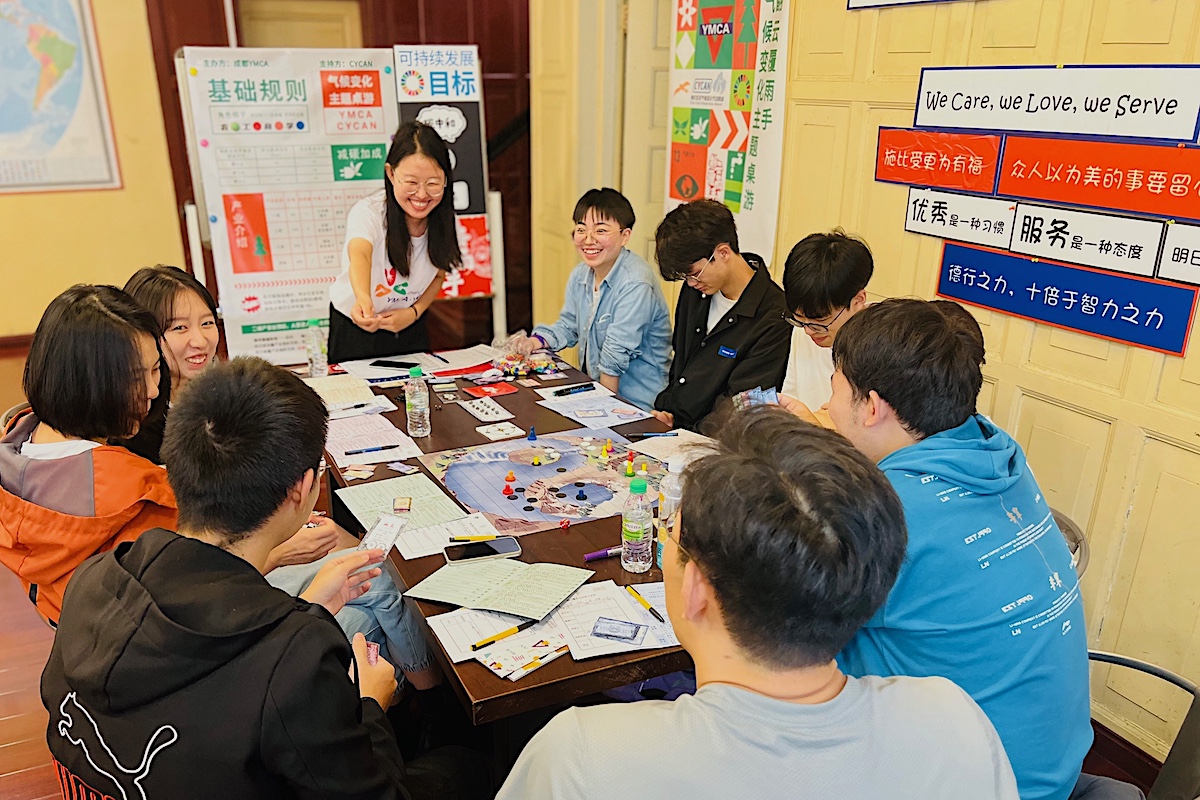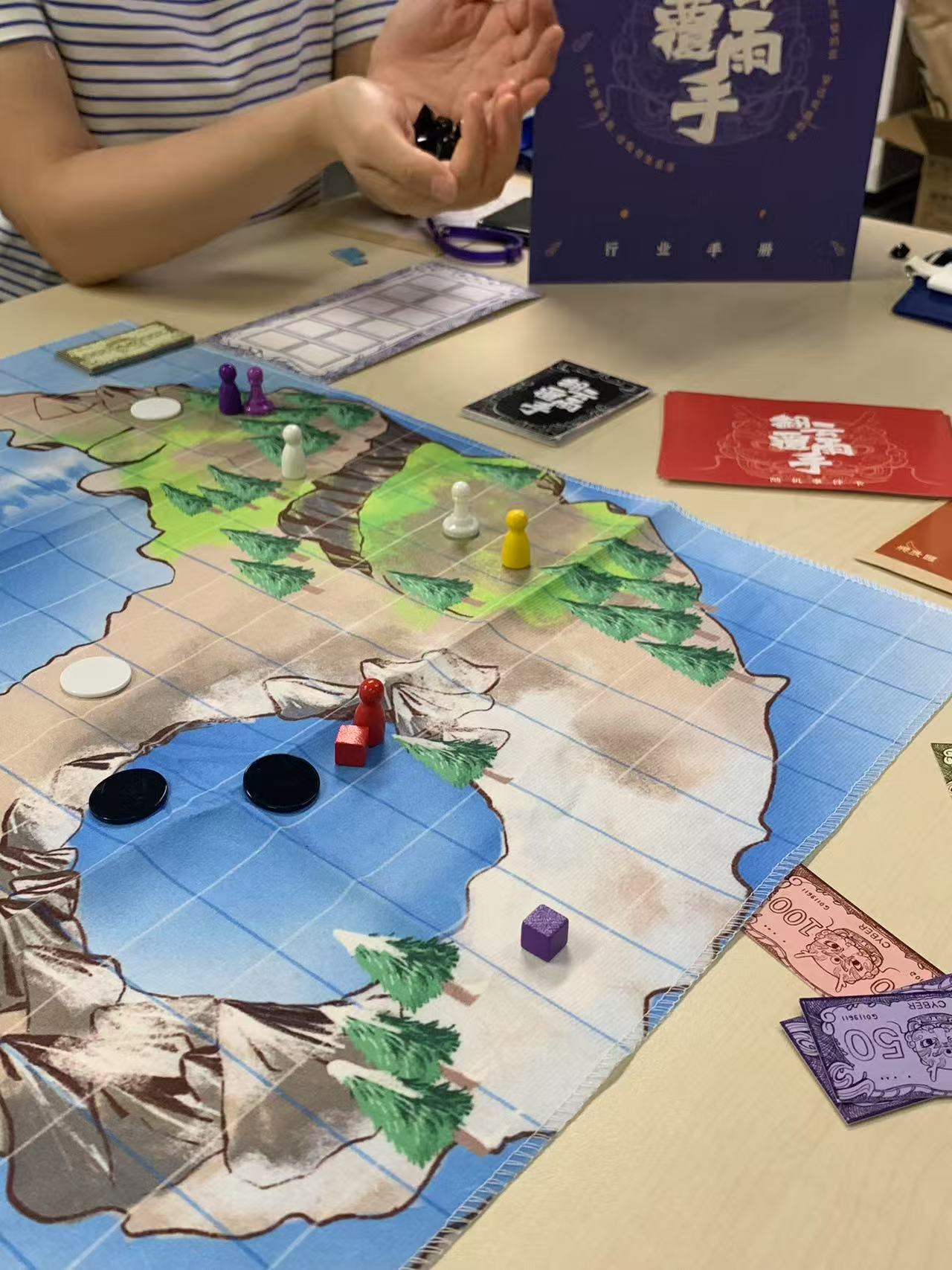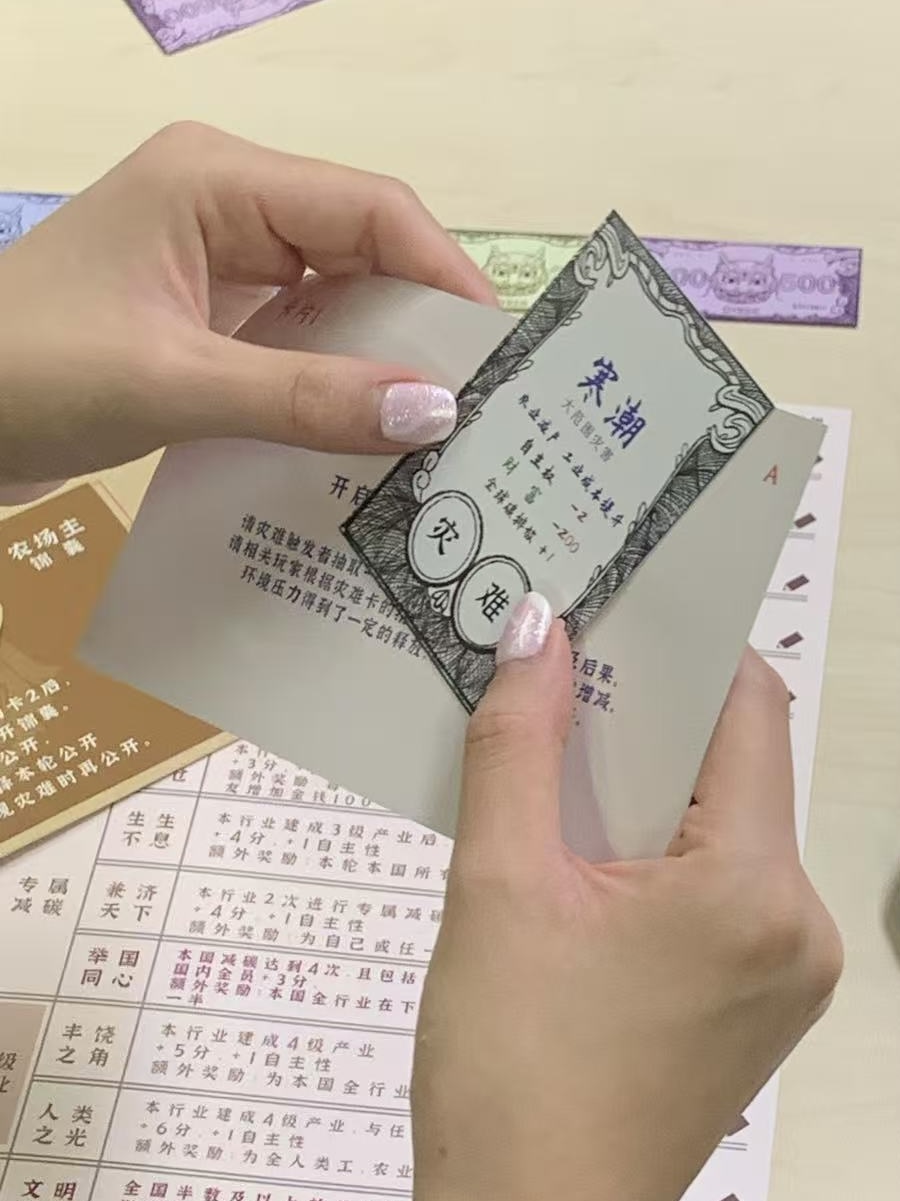The year is 2106. Humanity has left its physical form behind and now exists only as sparks of consciousness. The Dragon King takes pity on humanity and sends saviours. Can the two nations of Ocean and Soil kindle the sparks, rebuild their homes and prosper?
A powerful deity who rules over the seas and controls rain, storms and floods, Lóng Wáng (龙王) is often depicted as a dragon with human traits in Chinese mythology. He embodies both generosity and fury: bringing life-giving rain to farmers, but also unleashing destructive tempests when angered. As a guardian of natural forces, the Dragon King symbolises humanity’s fragile relationship with nature – both dependent on and vulnerable to its power.
This is the premise of Bringer of Clouds and Rain, a Chinese board game about improving civilisation while avoiding disaster. In the game, the Dragon King plays the role of the narrator and game master, similar to a dungeon master in role-playing games. Beyond guiding the gameplay, the Dragon King also acts as a “board game partner,” responsible for gathering players and promoting the game.
Since its creation five years ago, Dragon Kings have introduced the game, and the aspects of climate change it portrays, to over 6,000 players of all ages and walks of life.
The climate cost of development
The game involves two teams – the nations of ocean and of soil – each home to farmers, traders, workers and academics. Their job is to upgrade their industries and promote cultural progress, all while preventing disaster. The game is won when a country ensures its survival by upgrading half or more of its industries to Level 4.
Alongside more traditional metrics like health points and currency, the game has a “carbon pool”. When players build infrastructure or upgrade industries, carbon is added. When the pool is full, a disaster is triggered and a disaster card is drawn. Different events – a storm or a cold snap, for instance – affect different roles differently. Players can also reduce carbon emissions, and so avoid disaster, by making behavioural changes or investing in low-carbon tech.
“The core of the game is getting the understanding across that human activity creates carbon emissions, which cause disasters,” explained Zhang Silu, the game’s co-creator and secretary-general of the China Youth Climate Action Network (CYCAN). “Humanity needs to pay the price and reduce emissions if civilisation is to survive.” She started designing the game in 2021 to show people the climate consequences of development.
The game’s co-creator, Zhang Xinyue, hopes its interweaving of reality and myth will get that idea across. “When the two of us had the idea, the first thing I did was to draw a map in the shape of a yin-yang symbol, creating a world of opposites that coexist and compete,” she explained. “I wanted to build the Chinese history and philosophy into the roles and rules of the game, to show how civilisation had developed and what costs were incurred along the way.”
The game represents both the climate consequences of economic development, and how it can enable emissions cuts (Image: Duoduo)
When the carbon pool is full, after rounds of building infrastructure, players are forced to pull a disaster card like this “cold snap” (Image: Duoduo)
Simulating reality
Li Zhou works on education for the Chengdu branch of YMCA, a worldwide youth organisation. A board game fan, she became a Dragon King for Bringer of Clouds and Rain and has run several gaming sessions at environmental and youth camps. She has also combined gameplay with practical events and “Earth Day Challenges”, helping young players to apply what they learn in the game to the real world. Some who have played it have gone on to organise more sessions, further increasing the game’s reach.
She found that players don’t just become aware of the cost of development. They also realise development is the foundation for emissions cuts. That is, you need a certain level of it before you can cut emissions and protect the environment.
Players also get to have a stab at diplomacy. If one country or class keeps building and upgrading without cutting emissions, other players will turn against them. It’s a mirror of real-life climate negotiations and national responsibilities.
Zhang Silu points to many other ways the game reflects reality. For example, farmers are most vulnerable to disaster, suffering no matter what type of disaster card is drawn. Protecting farmland by investing in adaptation measures can unlock mechanisms that prevent disasters and add health points. This mirrors agriculture’s role in creating resilience to the impacts of climate change and being part of nature-based solutions to the problem. In this way, some players realise there are benefits to treating the planet well, she says.
Duoduo (not her real name) once worked as an ESG consultant in Shanghai and brought the game into the office. “The other ESG staff liked the carbon pool mechanism,” Duoduo recalls, noting how her coworkers made connections to climate concepts. “One of them, when the pool got full, exclaimed: ‘It’s like Earth Overshoot Day! We’ve already used up the planet’s resources for the year.’”
In the real world, the Stern Review, a landmark report on the economics of climate change published in 2006, described the climate crisis as “the biggest market failure in history”, because the social costs of emissions were not embodied in market prices. It occurs to your reporter that once players have seen how the game’s carbon pool restricts development, they might develop a better understanding of ideas such as carbon budgets and carbon trading.
From Dragon King to ordinary citizen
A game that’s no fun to play is not much of a game.
Zhang Silu and Zhang Xinyue were delighted when players enjoyed their educational game. But its design and spread were not one smooth process.
“The original version was too complicated, with players needing to remember too many different cards. It was too hard to get started, especially for anyone who doesn’t play board games much,” says Zhang Silu.
She recalls disagreements with Zhang Xinyue. In the first version, the Dragon King had a kind of undercover role, secretly sending disasters or blessings. That added an extra layer of interest that Zhang Xinyue was particularly proud of. But to keep things simple and playable, the mechanism was eventually dropped. The Dragon King became the game’s non-playing host and partner. In this capacity, Dragon Kings could more easily communicate climate knowledge.
Now the game was more playable. But how to get people to play it? A lot of educational game developers, often NGOs, collaborate with government bodies so they can quickly find their way into schools and institutions. That wasn’t an option for CYCAN, and the organisation didn’t have much in the way of resources to promote the game.
Over time, the “game partner” model of grassroots marketing took shape. Zhang Silu explained that going through government channels to get into schools would mean having to organise a big one-off event trying to find the few people interested in public affairs or environmental action.
Initially, CYCAN didn’t have strong criteria for game partners, and some turned out to have only a passing interest in the game. They learned that the most valuable partners were those who had a genuine interest in the game’s mission, the ability to get players together, and access to a venue. This made it easier to choose the right people. Currently, their diverse network of Dragon King partners includes community workers, NGO staff, researchers and ESG professionals.
Since 2023, CYCAN has also been working with local organisations, such as nature groups and libraries, which provide venues and support for Dragon Kings. The requirements for becoming a Dragon King have become stricter during this process. CYCAN also encourages partners to work together to hold events, to build a stronger community.
Zhang Silu stresses, though, that this isn’t just about direct climate communications. It’s also about volunteer development. Empowering partners to develop their skills and build communities creates a decentralised action network. And so, climate awareness passes from the Dragon Kings to the players and the wider community.
Today, Bringer of Clouds and Rain has 250 partners across more than a dozen cities in China. The game has been played on school and university campuses, in summer camps, in bookstores and in offices. As Zhang Silu says: “A game might not be able to cause someone to make very big changes, but it can pass on some basic knowledge or plant a seed. And that brings hope.”
Future hopes
Having observed game after game, the performance of younger players left the deepest impression on the team.
Zhang Silu remembers the first time a group of students played a round during an environment and ecology class at Beijing Normal University.
Some chose a competitive approach. When other countries were short of cash, they would snap up their industries at discount prices. The game’s mechanisms do allow for subsidies to fund more expensive cooperative approaches, but those players opted to try to win by being tough negotiators. They therefore missed out on a chance for everyone to win.
On another table, a girl had realised that development and infrastructural upgrades would require cutting emissions. She proposed taking turns. When one player was developing, another would cut emissions and vice versa. In the end, both won.
The team noticed younger players excelling when they were testing the game, too. Co-creator Zhang Xinyue recruited a range of pilot players including elementary school students and university teachers. She observed that the young students paid most attention to the rules and were most likely to figure out how to succeed. Some even interpreted the tagline on the box – “Through disaster to wisdom” – as a clue to work in harmony with nature. Older players though, particularly those with a background in economics or politics, were too busy plotting and competing. They often ended up driving their civilisations to collapse.
For the game’s co-creators and hosts, that’s the message of the game. If humanity continues to compete with itself, it will accelerate its failure. True wisdom, it seems, may be in cooperation and trust, no matter how naive that might seem at first.
\”,\”body\”:\”\”,\”footer\”:\”\”},\”advanced\”:{\”header\”:\”\\r\\n\”,\”body\”:\”\”,\”footer\”:\”\”}}”,”gdpr_scor”:”true”,”wp_lang”:”_en”,”wp_consent_api”:”false”};
/* ]]> */


